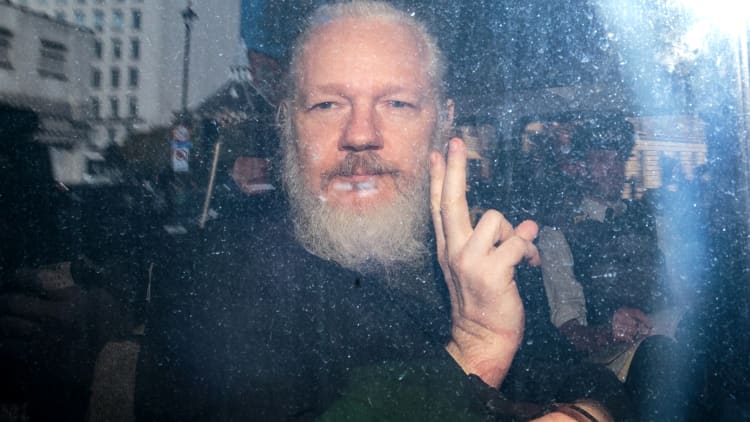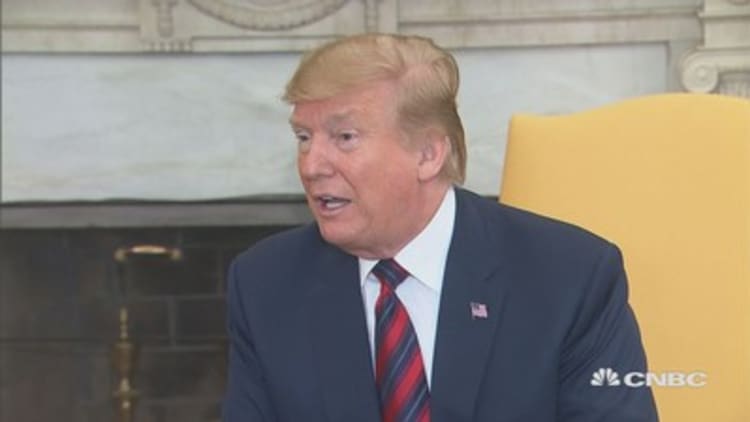Wikileaks co-founder Julian Assange was hit Thursday with new federal criminal charges alleging he conspired with former Army intelligence analyst Chelsea Manning to obtain and publish secret documents, some of which included the disclosure of identities of foreigners who were aiding the U.S. military abroad.
The new set of counts immediately raised alarms among press freedom advocates, who argue that charging Assange with violations of the Espionage Act could set a dangerous precedent for journalists.
Assange was charged with 17 new criminal counts: One count of conspiracy to receive national defense information, three counts of obtaining national defense information and 13 counts of disclosure of national defense information.

If convicted, he faces a maximum penalty of 10 years in prison for each of the new counts, according to the DOJ.
The charges, contained in an indictment issued in U.S. District Court for the Eastern District of Virginia, were revealed during a press conference held by Department of Justice officials in Washington.
Assange is currently in British custody after having been expelled from Ecuador's embassy in London, where he had lived for nearly seven years. Federal authorities want Assange to be extradited to the U.S. in order to face charges.
Julian Assange was "complicit" and "conspired with" Manning, an official said.
Officials said that Assange's publication of the names of human sources in the Middle East "is alleged to have created imminent risks to the life and liberty" of those individuals.
Assange, the officials said, "knew the publication of these sources endangered them."
The information could be seen by terror groups and countries hostile to the United States, and "documents related to this material was even found in the Osama bin Laden compound," an official said.
The Espionage Act
The U.S. has never successfully prosecuted a non-government official for publishing or sharing unlawfully leaked classified information, University of Chicago Law Professor Geoffrey Stone told NBC News.
Some press freedom groups and other people and entities defending Assange were quick to protest the new charges.
"This strikes at the heart of the First Amendment and puts all journalists in extreme danger," The Freedom of the Press Foundation said in a tweet Thursday afternoon.

Reporters Committee for Freedom of the Press Executive Director Bruce Brown said in a statement: "Any government use of the Espionage Act to criminalize the receipt and publication of classified information poses a dire threat to journalists seeking to publish such information in the public interest, irrespective of the Justice Department's assertion that Assange is not a journalist."
WikiLeaks itself tweeted that "this is madness. It is the end of national security journalism and the first amendment.
Edward Snowden, the former CIA official who leaked classified information from the National Security Agency in 2013, said, "This case will decide the future of media."
But an official pushed back on that characterization.
"Assange is not a journalist," the official told reporters. "No responsible actor, journalist or otherwise, would purposely publish names he or she knew to be confidential sources in warzones."
The indictment alleges that Assange's disclosures "risked serious harm" to U.S. national security "to the benefit of our adversaries." By publishing the names of human sources without redactions, Assange put them "at a grave and imminent risk of serious physical harm," prosecutors allege.
These human sources included "local Afghans and Iraqis, journalists, religious leaders, human rights advocates, and political dissidents," the DOJ said in a press release.
"This is a wholesale attack on freedom of speech, the media, and the first amendment," a lawyer for Assange told NBC in a text message.
Manning, meanwhile, is currently in jail for refusing to cooperate with a grand jury.
Asked if she had changed her stance, an official said: "Ms. Manning remains in jail."
Assange was arrested on April 7 in London on a single U.S.-lodged charge of conspiring to hack a U.S. government computer in 2010.
In that case, he was alleged to have conspired with Manning to crack passwords on government computers and to download large amounts of classified information with the intent on publishing them on WikiLeaks.
Those documents allegedly included approximately 800 Guantanamo Bay detainee assessment briefs, a quarter-million State Department cables and 400,000 Iraq War-related reports.
Assange had first sought asylum at the Ecuadorean embassy in 2012 to avoid extradition to Sweden, where he was accused of sexual assault.
But he remained in the embassy for years, in part due to fears that he could be arrested at the behest of American authorities for his work obtaining and publishing classified documents.
But he remained in the embassy even after Swedish authorities dropped their preliminary investigation of the sex assault case because of fears that he could be arrested at the behest of American authorities for his work obtaining and publishing classified documents.
On Monday, a Swedish prosecutor asked a court in Sweden to order that Assange be detained in his absence, "on probable cause suspected for rape."
That prosecutor, Eva-Marie Persson, said that "if the court decides to detain him, I will issue a European Arrest Warrant concerning surrender to Sweden." Assange is currently serving a 25-week sentence in the United Kingdom for failing to show up in court as ordered back in 2012 in connection with the case in Sweden.
It is not clear now whether Sweden or the U.S. will be able to extradite him, or, if so, which country will get him first.
"In the event of a conflict between a European Arrest Warrant and a request for extradition from the US, UK authorities will decide on the order of priority. The outcome of this process is impossible to predict. However, in my view the Swedish case can proceed concurrently with the proceedings in the UK," Persson said.
Read the full superseding indictment below:
This is breaking news. Please check back for updates.



